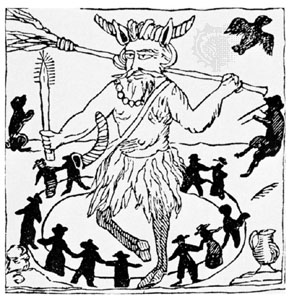Annotation:Robin Goodfellow
X:1 % T:Merry Pranks of Robin Goodfellow, The T:Dulcina R:march Z:2009 John Chambers <jc:trillian.mit.edu> B:Chappell - Popular Music of the Olden Times (1859) S:Pills to Purge Melancholy, 1720 M:C L:1/8 K:C [|c2ed c2G2 | E2C2 G2G2 | g2G2 d2ed | B2AG G4 | c2ed c2G2 | E2C2 G2G2 | c3G A2GF | E2DC C4 || || E2A^G A2c2 | c2A2 B2e2 | e2A2 fedc | BcBA A4 | c2ed c2G2 | E2C2 G2G2 | c3G A2GF | E2DC C4 ||

The Encyclopædia Britannica [1] explains: "Puck, in medieval English folklore, is a malicious fairy or demon. In Old and Middle English the word meant simply “demon.” In Elizabethan lore he was a mischievous, brownielike fairy also called Robin Goodfellow, or Hobgoblin. As one of the leading characters in William Shakespeare’s Midsummer Night’s Dream, Puck boasts of his pranks of changing shapes, misleading travelers at night, spoiling milk, frightening young girls, and tripping venerable old dames. The Irish pooka, or púca, and the Welsh pwcca are similar household spirits."
The air (as "Dulcina") appears in Thomas D'Urfey's Pills to Purge Melancholy (1720), to which Ben Johnson wrote his song of "Robin Goodfellow" or "The Merry Pranks of Robin Goodfellow," reprinted by Percy, Ritson and others. The song describes the escapades of the fairies. Two stanzas from it illustrate:
When lads and lasses merry be,
With possets and with juncates fine;
Unseen of all the company,
I eat their cakes and sip their wine;
And to make sport
I start and snort,
And out the candles I do blow:
The maids I kiss;
They shricke--Who's this?
I answer nought, but ho, ho, ho!
By wells and rills in meadows green,
We nightly dance our hey-day guise,
And to our fairy king and queen
We chant our moonlight minstrelsies.
When larks 'gin sing,
Away we fling;
And babes new-born steal as we go;
And elf in bed,
We leave instead,
And wend us, laughing, ho, ho, ho!
